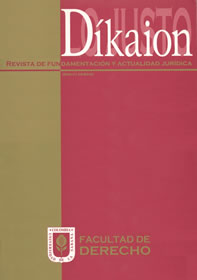Pluralismo y bien común en el derecho constitucional
Keywords:
Pluralism, common good, constitutional limits, state neutrality, democracy.Abstract
In this article, Professor Pablo Nuevo analyzes the consequences that neglect of the doctrine of common good is bringing on Constitutional Law. He bases his analysis from the incorporation of values to the code of laws executed by the Spanish Constitution of 1978. It may seem that this incorporation endows the Chart with a material content by which it turns to the service of the individual’s dignity and the values of justice, liberty, equality, and political pluralism.
Notwithstanding this positivation of an axiological order, in Prof. Pablo Nuevo’s opinion the understanding that the Constitutional Court has made of the value of pluralism helps weaken the constitutional State itself.
Prof. Pablo Nuevo believes that the Constitutional Court, hand by hand with the principle of democracy and the people’s sovereignty, has construed the pluralism value as relativism, thus denying the values a foundation beyond consensus. Understanding pluralism as equal legitimacy for every representation of humankind(**) and the world, which founds a right to follow this conception in all the aspects of social life, favors Constitution postulates to be understood like signifiers with no significance, meanings with no meaning, this having to be built form the majority principle.
This leads to both the weakening of fundamental rights and the gradual erosion of the social conditions the constitutional Estate may favor. As stressed by the author, the modern Estate lives on assumptions that it cannot create but, indeed, in any case destroy.
In Prof. Pablo Nuevo’s opinion, the liberal, pluralistic and individualistic constitutionalism of our times lacks the conceptual tools needed to untangle the state of uncertainty and doubts posed by our present western societies torn between their fear of Leviathan and the insecurity of an anomy world. The author argues that only by turning around natural law it is possible to organize political life as to effectively respect the dignity of the human being.
Downloads
Downloads
How to Cite
Issue
Section
License
1. Proposed Policy for Journals That Offer Open Access
Authors who publish with this journal agree to the following terms:
This journal and its papers are published with the Creative Commons License Attribution-NonCommercial-NoDerivatives 4.0 International (CC BY-NC-ND 4.0). You are free to share copy and redistribute the material in any medium or format if you: give appropriate credit, provide a link to the license, and indicate if changes were made; don’t use our material for commercial purposes; don’t remix, transform, or build upon the material.






